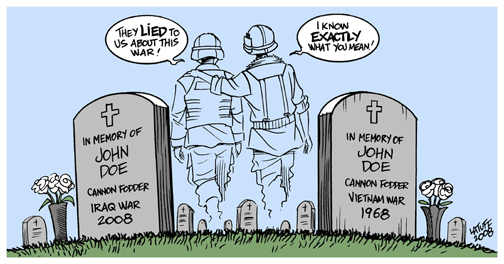Jonathan Apostol
ASA2 Section A01
Reflection #5
Response to From Saigon to Baghdad: The Vietnam Syndrome, the Iraq War, and American Foreign Policy by Andrew Priest
The topic of the Vietnam War continues its prominence in U.S. history and becomes a time period for which to question and criticize the United States' methods and procedures during wartime. After the war ended, literature analyzing its debilitating effects on the culture of the U.S. and on the minds and bodies of the soldiers and civilians involved circulated quickly. The Vietnam War brought the government to realize the dangers of its then interventionist approach to foreign policy and motivated a change in the goals of U.S. foreign policy to become less interventionist. Despite this, the U.S. continues to reinforce its imperialist policies by attempting to establish its "presence" in every geographic region, whether by diplomacy or force. In particular, examining the recent events in Iraq, many can question the motivations behind U.S. involvement in the Middle East. Although vastly different from the Vietnam War in terms of its costs in human life, one must also bring attention to the once again growing imperialism of the United States that was criticized so long ago. With the now greatly diversified population of the United States, it will now be up to us, the citizens, to combat the imperialist actions that the United States will likely pursue in the future. We must stand together, cross-ethnically and transnationally, to prevent such tragedies like the Vietnam War and the similar loss of life during the Iraq War.
1. How does the Vietnam War compare/contrast from the Iraq War?

No comments:
Post a Comment